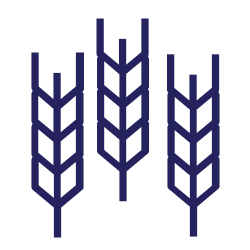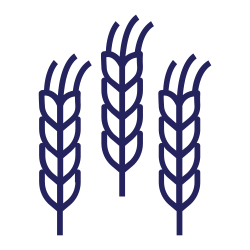Increasing grain yield in CWRS wheat while maintaining grain protein levels and baking quality
Crop Types
- Wheat
Collaborating Locations
University of SaskatchewanSummary
The benchmark information generated by this project will address the feasibility of achieving simultaneous genetic improvement in grain yield and baking quality-related traits in order to develop more resource-use efficient varieties.
Key Takeaways
-The high protein gene used reduced grain yield in a CWRS wheat genetic background (undesirable outcome).
-Stacking the high protein gene with a strong gluten gene allowed them to develop lines with strong gluten characteristics while increasing the protein content (desirable outcome).
-They were able to transfer a protein subunit associated with improved baking quality from einkorn wheat to spring wheat (desirable outcome).
-the yield penalty associated with Gpc-B1 may be a barrier to its wider adoption in the development of higher-yielding CWRS wheat germplasm.
Related Production Resources
Manitoba Crop Alliance’s production resources provide reliable agronomic information based on the latest research. Our resources have been developed to help farmers make productive and sustainable decisions on their farms throughout the growing season.
Related Research Projects

-
Start Date: 2019
-
Completion Date: 2022
-
Project Status: Completed
The goal of this study was to obtain a selection of crop varieties (Wheat & Canola) more resilient to excess moisture, better understand the amount and timing of excess moisture as it affects growing crops, and take measurements of critical… Read More

-
Start Date: 2016
-
Completion Date: 2018
-
Project Status: Completed
Given the large value of the farm investment in N fertilizer and expected returns to that investment, Manitoba wheat producers will receive financial benefits from optimizing fertilizer use on individual farms and fields. Read More

-
Start Date: 2015
-
Completion Date: 2020
-
Project Status: Completed
Little is known about how stem properties such as strength, diameter, wall wall width and height contribute to standability and few markers exist to select for preferred traits. This project will identify, dissect, and prioritize traits that contribute to maximum… Read More

-
Start Date: 2019
-
Completion Date: 2022
-
Project Status: Completed
Currently evaluation of moisture resilience by variety is not available for producers, in spite of moisture being the most probable cause for yield reductions. This project will evaluate the performance of MCVET varieties under extreme moisture conditions. Read More

-
Start Date: 2017
-
Completion Date: 2022
-
Project Status: Completed
This information will help producers make decisions on where to focus their input dollars and will provide an opportunity to highlight the effects of PGR’s in spring wheat production. This information can also be used to determine if the variety… Read More

-
Start Date: 2021
-
Completion Date: 2024
-
Project Status: Completed
This project aims to establish a simple, rapid and cost-efficient seed testing protocol by using a novel technique, named loop-mediated isothermal amplification (LAMP). Meanwhile, a greenhouse/growth cabinet disease evaluation method will be developed to screen barley germplasm for resistance, and… Read More

-
Start Date: 2021
-
Completion Date: 2024
-
Project Status: Ongoing
This project will aid in the development of long term tools for plant breeders. Read More

-
Start Date: 2021
-
Completion Date: 2022
-
Project Status: Completed
This project will focus on improving efficiencies of dryers currently installed by producers in MB and used for the other crops represented by MCA. A combination of engineering analysis and field testing will be peformed to quantify grain dryer efficiences… Read More

-
Start Date: 2020
-
Completion Date: 2025
-
Project Status: Ongoing
The deliverables of this project will complement other national and international efforts for the identification of virulence genes in F. graminearum, which are mainly focused on reverse genetic studies, meanwhile it exemplifies the necessity of integrating forward and reverse genetics… Read More

-
Start Date: 2020
-
Completion Date: 2025
-
Project Status: Ongoing
Our work will focus on the development and deployment of appropriate to marker-assisted selection of wheat DNA markers that will facilitate breeding of adapted to the prairie environment elite cultivars. These DNA markers and a germplasm carrying newly discovered resistance… Read More

-
Start Date: 2021
-
Completion Date: 2025
-
Project Status: Ongoing
This project aims to breed more resilient crop varieties in the face of water stress Read More

-
Start Date: 2020
-
Completion Date: 2023
-
Project Status: Ongoing
The long-term goal of this research, is to utilize natural immunity in wheat germplasm to identify new sources of effective resistance. The novel resistance genes identified will eventually be passed on to wheat breeding programs for development of FHB and… Read More
-
Start Date: 2021
-
Completion Date: 2025
-
Project Status: Ongoing
This project will aim to develop new varieties, wth improved yields through the selection of lines with optimal reproductive and spike traits. Read More

-
Start Date: 2021
-
Completion Date: 2024
-
Project Status: Ongoing
Management strategies are being challenged by the rapidly evolving and changing populations of these fungi, which are overcoming disease resistance genes and may be acquiring fungicide tolerance. In addition, these diseases can be caused by several different fungal species as… Read More

-
Start Date: 2021
-
Completion Date: 2024
-
Project Status: Ongoing
This project will investigate the application of RNA-based fungicides to control major diseases of crops grown on the prairies, namely wheat and canola. This approach is based on proven research that has demonstrated that the application of RNA molecules directly… Read More

-
Start Date: 2019
-
Completion Date: 2024
-
Project Status: Ongoing
The knowledge, germplasm and markers generated from this project will accelerate breeding cycles and benefit the wheat industry. Read More

-
Start Date: 2022
-
Completion Date: 2025
-
Project Status: Ongoing
Recently, an emerging disease caused by pathogenic Xanthomonas translucens known as bacterial leaf streak (BLS) has been reported in a number of fields in western Canada leading to heightened general concerns among wheat growers. This project will gather information on… Read More

-
Start Date: 2022
-
Completion Date: 2025
-
Project Status: Ongoing
The new source of Fusarium resistance (not yet tapped by local breeders), combined with the resistance already present in commercial cultivars, could reduce the impact of more aggressive F. graminearum chemotypes on grain yield and quality losses as well as… Read More

-
Start Date: 2022
-
Completion Date: 2026
-
Project Status: Ongoing
Markers developed in this proejct will accelerate the breeding process and make trait monitoring more accurate and cost effective over traditional phenotyping. Improved resistance to FHB will protect the producer's grades as well as milling and baking quality of Canadian… Read More

-
Start Date: 2022
-
Completion Date: 2025
-
Project Status: Ongoing
The results from this project will help determine whether it is possible to enhance the effects of the Sm1 gene in terms of protecting the grain yield of spring wheat as well as increasing the quality/grade of the harvested crop.… Read More
Project Details
Field Issues
- Other



